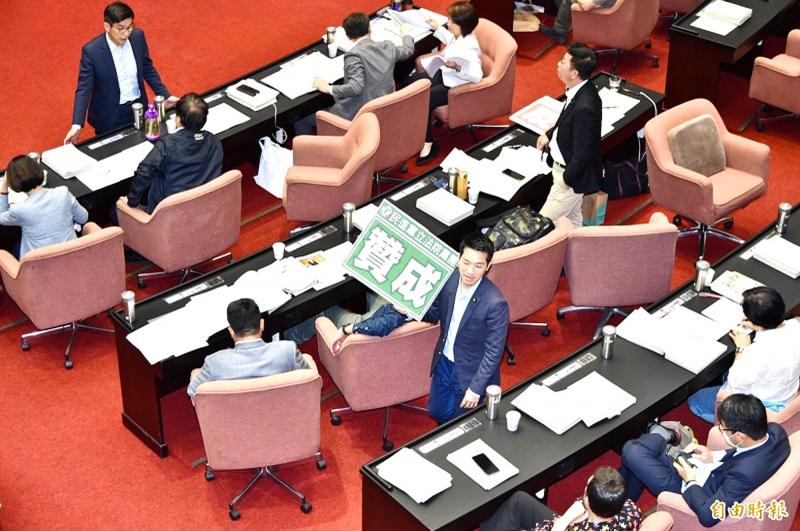Lawmakers yesterday continued to slog through a review of a draft “national judge act” that began on Monday afternoon, covering only one-third of the act, or 37 articles, by noon.
However, lawmakers vowed to complete the review of the draft and the third reading by midnight yesterday.
A total of 113 articles have been proposed for the draft, and after three rounds of deliberation, 100 articles still needed to be discussed.

Photo: Tu Chien-jung, Taipei Times
The draft articles that passed a second reading yesterday include that the lay judge system would comprise three career judges and six lay judges, with the lay judges being chosen from citizens aged 23 and over who have resided within the jurisdiction of the court for at least four months.
As of press time last night, lawmakers were expected to review draft articles on lay judges obtaining days off from work, and on whether lay judges would have access to the dossier and evidence.
While the review was continuing in the main chamber, the Chinese Nationalist Party (KMT) caucus held a news conference outside the legislative complex.
KMT caucus whip Lin Wei-chou (林為洲) told reporters that the Democratic Progressive Party’s (DPP) past guidelines and 17 DPP legislators favored a jury system instead.
The DPP was selling out, choosing to give the public a lay judge system — a decision that was “made behind closed doors with the Judicial Yuan” — which would allow professional judges to continue to be the main decisionmakers in the judicial processes, Lin said.
The KMT’s version of the act is that of a moderated lay judge system, which was formulated after much discussion with experts and civic groups, Lin said.
The KMT’s version, which would utilize a lay judge system and jury system simultaneously, shows the true spirit of reform, he said.
DPP caucus whip Ker Chien-ming (柯建銘) said that the DPP’s view has changed over time.
The party’s guidelines were formulated under an autocratic government and called for a transparent judicial process with a jury formed by party representatives, National Assembly representatives and other morally upstanding people, Ker said.
This differs from the standard definition of a jury system, he said.
The US’ legal system cannot be transplanted directly to Taiwan; doing so would require sweeping changes to laws such as the Code of Criminal Procedure (刑事訴訟法) and re-educating law students and lawyers, Ker said.
The DPP is doing what a responsible political party would do, Ker said, adding that the KMT’s proposal for two legal systems working side-by-side would not work.

US President Donald Trump said "it’s up to" Chinese President Xi Jinping (習近平) what China does on Taiwan, but that he would be "very unhappy" with a change in the "status quo," the New York Times said in an interview published yesterday. Xi "considers it to be a part of China, and that’s up to him what he’s going to be doing," Trump told the newspaper on Wednesday. "But I’ve expressed to him that I would be very unhappy if he did that, and I don’t think he’ll do that," he added. "I hope he doesn’t do that." Trump made the comments in

NOT AN OPENING: Trump’s violation of international law does not affect China’s consideration in attacking Taiwan; Beijing lacks capability, not precedent, an official said Taiwanese officials see the US’ capture of the president of Venezuela as a powerful deterrent to Beijing’s aggression and a timely reminder of the US’ ability to defeat militaries equipped with Chinese-made weapons. The strikes that toppled Venezuelan President Nicolas Maduro signaled to authoritarian leaders, including Chinese President Xi Jinping (習近平), US President Donald Trump’s willingness to use military might for international affairs core to US interests, one senior official in Taipei’s security circle said. That reassured Taiwan, the person said. Taipei has also dismissed the idea that Trump’s apparent violation of international law could embolden Beijing, said the official, who was not

A cold surge advisory was today issued for 18 cities and counties across Taiwan, with temperatures of below 10°C forecast during the day and into tonight, the Central Weather Administration (CWA) said. New Taipei City, Taipei, Taoyuan and Hsinchu, Miaoli and Yilan counties are expected to experience sustained temperatures of 10°C or lower, the CWA said. Temperatures are likely to temporarily drop below 10°C in most other areas, except Taitung, Pingtung, Penghu and Lienchiang (Matsu) counties, CWA data showed. The cold weather is being caused by a strong continental cold air mass, combined with radiative cooling, a process in which heat escapes from

Snow this morning fell on Alishan for the first time in seven years, as a strong continental cold air mass sent temperatures plunging across Taiwan, the Central Weather Administration (CWA) said. The Alishan weather station, located at an elevation of about 2,200m in central Taiwan, recorded snowfall from 8:55am to 9:15am, when the temperature dropped to about 1°C, the CWA said. With increased moisture and low temperatures in the high-altitude Alishan area, the conditions were favorable for snow, CWA forecaster Tsai Yi-chi (蔡伊其) said. The last time snow fell at the Alishan weather station was on Jan. 10, 2018, while graupel fell there